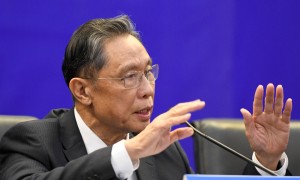When the direct trading link between stock markets in Shenzhen and Hong Kong opened this month, local dignitaries were easy to spot at the launch events. Less conspicuous were international investors ready to take advantage of what was billed as a big opportunity to buy into Chinese equities. 当连接深圳、香港两地股市的“深港通”本月开通时,开通仪式上很容易看到一众地方显贵的身影。不那么惹人注意的是国际投资者,他们已准备好利用这一工具——被宣传为买入内地股票的巨大机遇。
The link offers foreign investors greater access to shares on the Shenzhen Stock Exchange, home to some of China’s up and coming technology companies. However, flows into the newly available market reached just a fifth of their daily limit on its debut and have failed to match that since. 深港通为外国投资者买卖深交所(Shenzhen Stock Exchange)股票提供了更大的便利。不少中国很有前途的科技公司都在深交所上市。然而,深港通开通首日,深股通额度只用掉了五分之一,此后每个交易日用掉的额度都未超过这一比例。
Judged by the money, international interest in Chinese stocks remains anaemic. However, talk to strategists focused on the country and many think the world’s second-largest capital market could be on the brink of another bull run. 从资金流量上看,国际投资者对中国股市仍然兴趣不足。然而,与专注中国的策略师聊一聊,可以发现他们中不少人认为这个全球第二大资本市场可能即将迎来另一轮牛市行情。
“China is a market we still like,” says Andrew Swan, head of Asian Equities at BlackRock. “There’s incredible dispersion in this market and a lot of change, whether it is driven by regulation or reform, but also change driven by technology and within that we can find some fantastic opportunities.” “中国仍是我们喜爱的市场,”贝莱德(BlackRock)亚洲股票主管施安祖(Andrew Swan)说,“这个市场有着极高的离散性和很大变数,有由监管或改革驱动的,但也有由科技驱动的,从中我们可以找到一些极好的机会。”
The scepticism of international investors is understandable. It has been more than a year since Chinese stock markets were synonymous with anything other than headaches. The last big bull market in early 2015 was eye-popping in scale. The bust that followed in June 2015 was brutal, and investors whose money was trapped when about half of the shares listed in China were suspended still bear the scars. 国际投资者的疑虑可以理解。一年多来,中国股市一直是头痛的代名词。2015年初的上一轮大牛市规模惊人。2015年6月随之发生的崩盘是残酷的,在沪深两市约半数股票停牌时资金被套牢的投资者,至今仍感到后怕。
Since then, angst about China’s currency policy has triggered two more episodes of global market turmoil and, as the year ends, worries about further depreciation of the renminbi are growing. 自那以后,对中国汇率政策的担忧又引发过两次全球市场动荡。在今年即将结束之际,对人民币进一步贬值的担忧正与日俱增。
Small wonder that Chinese companies listed in Hong Kong — still the broadest means of gaining exposure to the country’s equities — are trading on a soggy eight times expected earnings, compared with a ratio of 15 times for the broader MSCI Asia-Pacific.
Yet strategists at Morgan Stanley have upgraded China to “overweight” for the first time in 18 months, looking for a rally led by renewed earnings growth. Others are focused on a potential misunderstanding by western investors of changes unfolding in China. Jason Sun, chief China strategist at Citi, describes his view as “non-consensus positive” and argues there are three main sources of confusion. 难怪,在香港上市的内地企业——H股仍是购买中国公司股票的最普遍方式——的预期市盈率只有可怜的8倍,相比之下,涵盖更广的MSCI明晟亚太指数(MSCI Asia-Pacific)的市盈率为15倍。
“The first is we think clients are overly concerned about the financial systemic risk for the whole banking system, the second is that we think clients are overly concerned about the property tightening-related downside risk next year,” Mr Sun says. “And, thirdly, we think clients underestimate the China reform process.” 然而,摩根士丹利(Morgan Stanley)的策略师18个月来首次将中国的评级调升为“增持”(overweight),他们预计中国公司股票将在新的盈利增长带动下迎来一波反弹。还有一些策略师专注的是西方投资者对中国正在发生的变化可能存在的误解。花旗(Citi)首席中国策略师孙贤兵(Jason Sun)形容自己对中国的看法为“正面但与共识不同”,并认为导致误解的主要有三点。
The country’s debt pile is a particularly long-running concern for China watchers. Overall debt has risen to more than 250 per cent of gross domestic product from about 150 per cent 10 years ago — a dizzying increase. “首先,我们认为,客户对整个银行系统的金融系统性风险过于担忧;第二,我们认为,客户对与明年房地产紧缩相关的负面风险过于担忧,”孙贤兵说,“第三,我们认为,客户低估了中国改革进程。”
However, bulls argue this may be peaking, and in key areas, beginning to ease. 中国的债务积累尤其是观察人士长期担心的问题。中国总体债务与国内生产总值(GDP)之比已从10年前的150%暴增至超过250%。
“We acknowledge that the overall gearing level is high, [but] we do not believe there is an imminent risk of a short-term crisis,” says Mike Shiao, Invesco’s chief investment officer for Asia ex-Japan, who points to the locally funded nature of most Chinese debt as well as banks’ efforts to diversify from corporate lending into lower-risk household loans. 不过,多头认为,中国的债务增长可能即将见顶,在关键领域已经开始放缓。
Mr Sun, who recommends investors go overweight on banks and insurers, thinks the peak of corporate lending has already passed with the increase of debt in troubled sectors such as steel and coal slipping below economic growth rates.
“There is too much risk priced in,” he says. “What we think the consensus may miss about China is that this data are just too lagging [and] they’re not able to capture very recent credit controls.” 景順(Invesco’s)除日本以外亚洲地区首席投资官萧光一(Mike Shiao)说:“我们承认整体负债水平很高,但我们认为短期不存在发生危机的紧迫风险。”他指出大部分中国债务从本地筹资的特点,以及银行业通过低风险家庭贷款分散企业贷款风险的努力。
One of the biggest risks for China, however, may be outside its control — namely the course Donald Trump takes once he assumes the US presidency next month. The president-elect has threatened to label China a currency manipulator and impose 45 per cent tariffs on the country’s imports. 孙贤兵建议投资者增持银行和保险公司,他认为随着钢铁、煤炭等问题行业的债务增速降至低于经济增长率,企业贷款的高峰已经过去。
Analysts acknowledge the danger — which could lop more than a percentage point off Chinese growth by some estimates — but think the likelihood of Mr Trump making good on his threats is slim since it would hit the US too. Prices of everyday items would rise and potentially, the costs of high-value US exports such as aircraft if China retaliated. 他说:“太多风险被计入了价格。我们认为关于中国的共识可能没有考虑到的一点是,这些数据实在过于滞后,无法体现最近才出现的那些信贷管控。”
“One, you’ll hurt American companies, and second you’ll hurt US consumers,” says Francis Cheung, head of China and HK strategy for CLSA, who believes the US might instead target certain sectors, with steel, aluminium, cars and solar-related products among the most likely candidates. 但中国面临的一大风险可能在其掌控之外,即唐纳德?特朗普(Donald Trump)在下个月就任美国总统后将要采取的方针。这位当选总统威胁要把中国认定为汇率操纵国,对进口自中国的商品征收45%的关税。
“Maybe [Mr Trump’s]’s angle is to try and get better access for US companies,” he said. “That's the only way any of this makes sense.” 分析师承认存在这一风险(根据某些估算,这一风险可能导致中国经济少增长一个百分点),但他们认为特朗普将其威胁付诸实施的可能性不大,因为这么做也会打击到美国,会导致美国日常物品价格上升,而且如果中国展开报复,美国出口的高价值产品(如飞机)的成本也会增加。
This year the Shanghai Composite and its Shenzhen counterpart are down 12 per cent and 15 per cent respectively in local currency terms. Crucially, neither has broken below its average valuation of the past five years, according to Morgan Stanley, implying sentiment has not been so thoroughly crushed as it was in the four-year bear market that ran until 2014. 里昂证券(CLSA)中国内地和香港策略主管郑名凯(Francis Cheung)说:“第一,你会伤及美国企业,第二,你会伤及美国消费者。”他认为美国可能改为针对某些行业,钢铁、铝、汽车和太阳能相关产品是最有可能的目标。
“Overall, we expect a more extended and subdued A-share bull market period than last time,” says Jonathan Garner, chief Asia and emerging markets equity strategist for Morgan Stanley. “Lessons have been learnt by the regulator in relation to margin trading and futures trading and policing IPO activity.” 他说:“也许特朗普的目标是尝试让美国公司获得更大的市场。只有这样才说得通。”
China bulls will be counting on it. 今年上证综指(Shanghai Composite)和深证综指(Shenzhen Composite)以人民币计分别下跌了12%和15%。但据摩根士丹利(Morgan Stanley),关键是这两个指标都没有跌破过去五年平均估值水平,意味着市场情绪没有像在持续到2014年的四年熊市中那样彻底崩溃。
摩根士丹利亚洲和新兴市场首席股票策略师郭强盛(Jonathan Garner)表示:”总体而言,我们预计A股会出现一轮比上次更久、更温和的牛市行情。监管机构在保证金交易、期货交易以及监管首次公开发行(IPO)方面已经吸取了经验教训。“
看好中国的人将仰仗这一点。
译者/何黎







